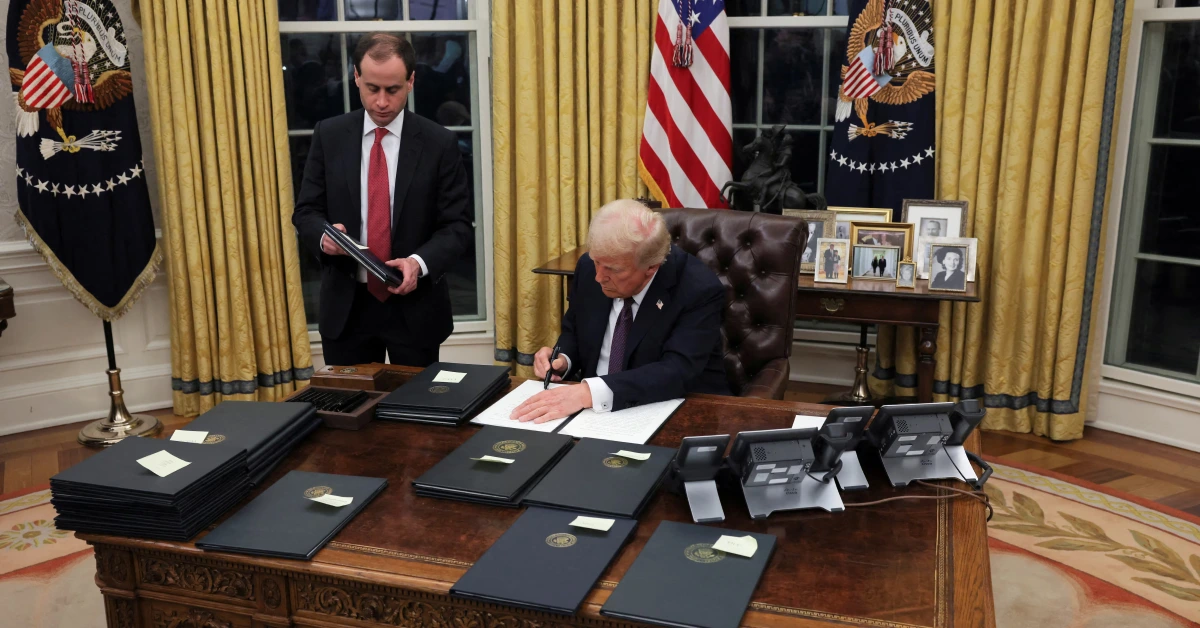
USA – In one of the first executive actions of his second term, U.S. President Donald Trump initiated the process of withdrawing the country from the World Health Organization (WHO) for the second time in less than five years.
This move, which has sparked concerns among experts, threatens to reverse significant progress made in combating infectious diseases such as AIDS, malaria, and tuberculosis, and could undermine global health defenses against future pandemics.
During his first appearance in the Oval Office after being sworn in, Trump signed an executive order to begin the withdrawal process.
Upon receiving the document, he exclaimed, “Ooh, that’s a big one!” The order outlines steps such as halting U.S. government funding to the WHO, recalling U.S. personnel working with the organization, and encouraging officials to identify new partners to take over WHO’s responsibilities.
This is not the first time Trump has attempted to sever ties with the WHO. In 2020, during the COVID-19 pandemic, he announced the U.S. would withdraw, citing the organization’s handling of the crisis.
President Joe Biden reversed this decision shortly after taking office in January 2021, but now Trump has revived his plans to leave the organization.
WHO, a specialized agency of the United Nations, plays a critical role in coordinating global health responses, especially during outbreaks of diseases like Ebola, mpox, and polio.
It also supports poorer countries with technical assistance, helps distribute vaccines and treatments, and sets global health guidelines.
Dr. Lawrence Gostin, Director of the WHO Collaborating Center on Global Health Law at Georgetown University, warned that a U.S. withdrawal would weaken WHO’s efforts, stating, “A U.S. withdrawal from WHO would make the world far less healthy and safe.”
Dr. Tom Frieden, former CDC Director, echoed these concerns, emphasizing that withdrawing from WHO would diminish the U.S.’s leadership in global health, increasing the risk of pandemics.
The U.S. has the legal ability to withdraw from WHO, but it requires congressional approval and must meet its financial obligations to the organization for the current fiscal year.
The U.S. joined WHO in 1948 through a joint resolution passed by Congress, and the agreement mandates a one-year notice before leaving. If the U.S. follows through on its withdrawal, it would have a significant impact on WHO.
As one of the organization’s largest donors, the U.S. contributes hundreds of millions of dollars annually, which makes up a substantial portion of WHO’s $2 to $3 billion budget.
This funding supports global health initiatives, including polio eradication, maternal and child health programs, and research into emerging diseases. U.S. agencies that collaborate with WHO, such as the CDC, would also be affected.
Withdrawal would exclude the U.S. from critical activities coordinated by WHO, such as determining the composition of annual flu vaccines and gaining access to genetic databases vital for developing new treatments and vaccines.
Trump’s rationale for withdrawing stems from his dissatisfaction with WHO’s handling of the COVID-19 pandemic.
At a rally, he accused the organization of being “dominated by corporate power and China” and criticized its response to the pandemic, particularly the delays in acknowledging airborne transmission of the virus and early guidance on mask-wearing.
Trump’s executive order cites WHO’s failure to reform and its inability to remain politically independent as reasons for the withdrawal.
WHO’s response
In response to President Trump’s decision, WHO expressed regret and urged the U.S. to reconsider its move.
The organization highlighted the long-standing partnership between the U.S. and WHO, which has been instrumental in achieving significant global health victories, such as eradicating smallpox and bringing polio to the brink of elimination.
WHO Director-General Tedros Ghebreyesus emphasized the importance of continued U.S. involvement in WHO’s efforts, underscoring the need for ongoing collaboration to address future global health challenges.
In a statement on Tuesday, Ghebreyesus stressed how much WHO has benefited from the partnership with the U.S. and reiterated the organization’s crucial role in global health.
“The World Health Organisation regrets the announcement that the United States of America intends to withdraw from the Organisation,” Ghebreyesus said.
He further explained, “WHO plays a crucial role in protecting the health and security of the world’s people, including Americans, by addressing the root causes of disease, building stronger health systems, and detecting, preventing, and responding to health emergencies, including disease outbreaks, often in dangerous places where others cannot go.”
He reminded that the U.S. was a founding member of WHO in 1948 and has been actively involved in shaping and governing the organization’s work ever since.
“This is alongside 193 other Member States, including through its active participation in the World Health Assembly and Executive Board. For over seven decades, WHO and the USA have saved countless lives and protected Americans and all people from health threats,” Ghebreyesus said.
He also noted the joint success in eradicating smallpox and bringing polio to the edge of elimination. “American institutions have contributed to and benefited from membership in WHO,” he added.
Ghebreyesus highlighted that, with the participation of the U.S. and other Member States, WHO has implemented the largest set of reforms in its history over the past seven years. He emphasized that this work is ongoing.
“We look forward to engaging in constructive dialogue to maintain the partnership between the USA and WHO, for the benefit of the health and well-being of millions of people around the globe,” he concluded.
XRP HEALTHCARE L.L.C | License Number: 2312867.01 | Dubai | © Copyright 2025 | All Rights Reserved